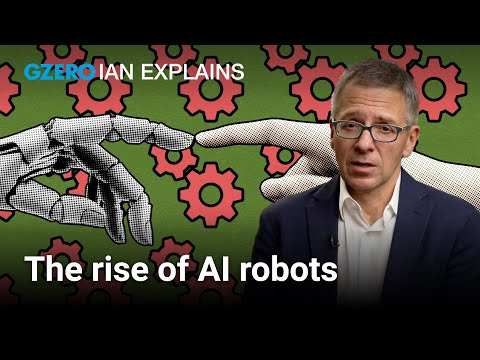October 24, 2025
Could the future of AI be physical? On Ian Explains, Ian Bremmer breaks down the rapid pace of AI advancement—from generative tools like ChatGPT to agentic AI that performs autonomous tasks like a digital employee. Physical AI is where algorithms meet hardware, like robots and drones. Machines that don’t just process information but sense, move and manipulate the world around us. Big tech companies are pouring billions into robotics research, convinced that in order to truly change our world, AI needs to become a part of it.
Whoever dominates, the payoff will be huge. Autonomous machines will transform industries like transportation, healthcare, and logistics. They can offset labor shortages in aging societies like Germany, Japan, and South Korea. Morgan Stanley estimates humanoid robots could be a $5 trillion industry by 2050. But at least right now, physical AI is still awkward. Robots stumble and all down. Programming dexterity and intuition is a lot more challenging than text prediction. But given how fast the field is accelerating, soon, the challenge won’t be whether AI becomes part of our world but how we choose to live with it.
GZERO World with Ian Bremmer, the award-winning weekly global affairs series, airs nationwide on US public television stations (check local listings).
New digital episodes of GZERO World are released every Monday on YouTube. Don't miss an episode: subscribe to GZERO's YouTube channel and turn on notifications (🔔). GZERO World with Ian Bremmer airs on US public television weekly - check local listings.
From Your Site Articles
More For You
- YouTube
How widely is AI actually being used, and where is adoption falling behind? Speaking at the 2026 World Economic Forum in Davos, Brad Smith, Vice Chair and President of Microsoft, outlined how AI adoption can be measured through what he calls a “diffusion index.”
Most Popular
- YouTube
AI adoption is accelerating worldwide, but “diffusion” isn’t just about who has the best models. It’s about who has the basics: affordable power, reliable connectivity, and the skills to actually use AI. In a new GZERO Media Global Stage livestream from the 2026 World Economic Forum in Davos, Switzerland, CNN’s Richard Quest moderates a clear-eyed discussion on what it will take to broaden AI access, and what happens if the gap widens.
- YouTube
Now that we are all on same page. #PUPPETREGIME
© 2025 GZERO Media. All Rights Reserved | A Eurasia Group media company.
